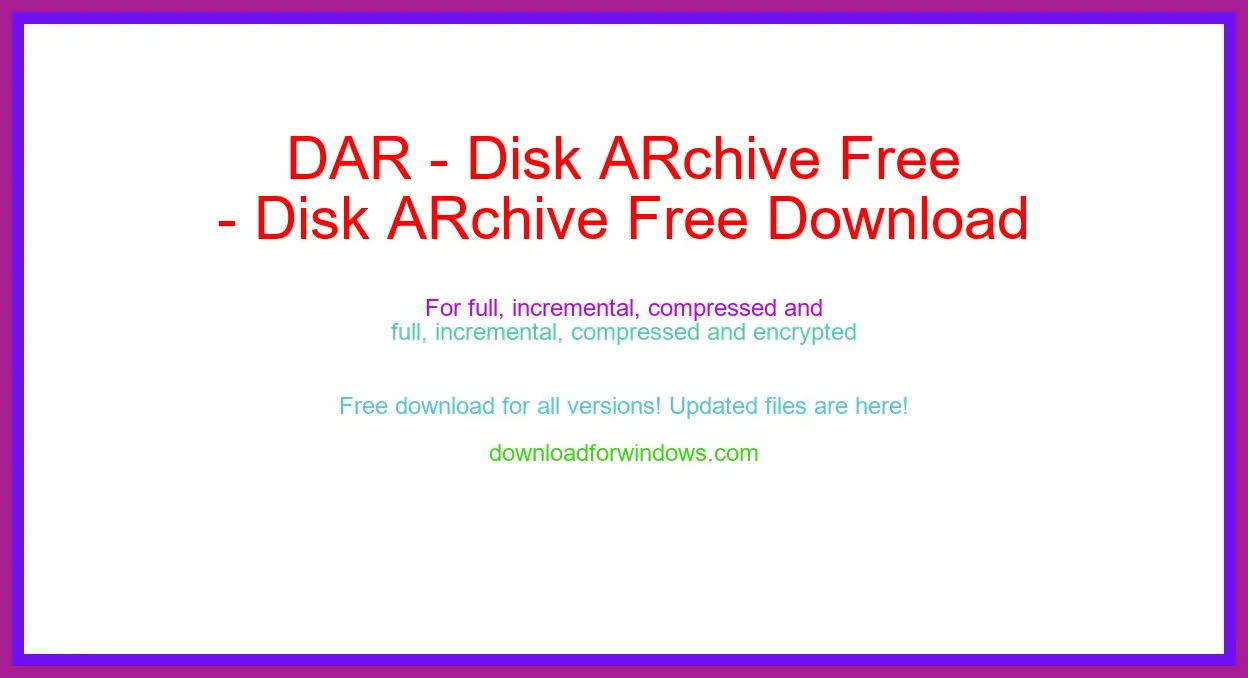DAR - Disk ARchive Free Download for Windows & Mac
For full, incremental, compressed and encrypted backups or archives - DAR - Disk ARchive

Published Date: 2024-04-13
DAR - Disk ARchive Free Download
DAR - Disk ARchive Free Download for Windows & Mac
DAR is a free and open-source data recovery software that can recover lost or deleted files from hard drives, USB drives, and other storage devices. It supports a wide range of file systems, including NTFS, FAT32, and HFS+. DAR is easy to use and can be used to recover files that have been deleted accidentally, formatted, or lost due to a virus or malware attack. DAR Disk Archive can create a compressed archive of all your files and folders and the contents of other disk drives on your Mac. You can also use DAR to restore your files and folders from an archive.
DAR Disk Archive stores all of the data in a single file on your Mac's hard drive or on a disk drive. Because the archive is in a compressed format, it is typically much smaller than the original data. The archive file is designed to be portable, so you can copy it to another disk drive or transfer it over a network. The archive format uses the ".dar" extension. DAR is a command-line utility, so you will need to use the Terminal application to run it. DAR is available for free download from the Mac App Store.
DAR - Disk ARchive : DAR is a command-line backup and archiving tool that uses selective compression (not compressing already compressed files), strong encryption, may split an archive in different files of given size and provides on-fly hashing, supports differential backup with or without binary delta, ftp and sftp protocols to remote cloud storage Archive internal's catalog, allows very quick restoration even a single file from a huge, eventually sliced, compressed, encrypted archive eventually located on a remote cloud storage, by only reading/fetching the necessary data to perform the operation. Dar saves *all* UNIX inode types, takes care of hard links, sparse files as well as Extended Attributes (MacOS X file forks, Linux ACL, SELinux tags, user attributes) and some Filesystem Specific Attributes (Linux ext2/3/4, Mac OS X HFS+) more details at: http://dar.linux.free.fr/doc/Features.html
_Download_Full_____UPDATE.webp)
_Download_Full_____UPDATE.webp)
_Download_Full_____UPDATE.webp)
_Download_Full_____UPDATE.webp)
_Download_Full_____UPDATE.webp)
_Download_Full_____UPDATE.webp)
_Download_Full_____UPDATE.webp)
_Download_Full_____UPDATE.webp)
_Download_Full_____UPDATE.webp)
_Download_Full_____UPDATE.webp)